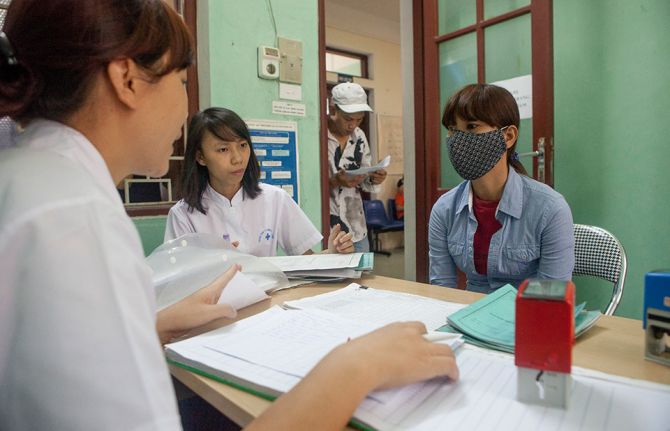

Press Statement
UNAIDS applauds the commitment of United Nations Member States to provide 1 billion more people with quality health services by 2023
23 September 2019 23 September 2019UNAIDS stresses the critical need to engage civil society and communities in every aspect of universal health coverage in order to leave no one behind
NEW YORK/GENEVA, 23 September 2019—UNAIDS welcomes the strong commitment made by United Nations Member States to achieve universal health coverage (UHC) by 2030. Member States recommitted to achieving UHC at the first ever United Nations General Assembly High-Level Meeting on Universal Health Coverage, which took place in New York, United States of America, on 23 September. During the meeting, United Nations Member States adopted a political declaration on UHC in which they reaffirmed the right of people to enjoy the highest attainable standard of physical and mental health as an integral part of the Sustainable Development Goals.
In the worrying context of shrinking civic space, UNAIDS is encouraged by the call made by Member States in the political declaration to engage civil society in health system governance, in health policies and in the UHC review process. Engaging civil society and communities worldwide will be critical to ensuring the overall success of UHC.
“We strongly urge governments to invest in the leadership and capacities of diverse communities, especially those that are underrepresented,” said Gunilla Carlsson, UNAIDS Executive Director, a.i. “To reach the furthest behind, universal health coverage needs to engage communities and prioritize rights-based, transformative approaches. This will ensure equity in access to health services, deliver people-centred results and eliminate health disparities.”
UNAIDS is committed to enabling communities, particularly vulnerable communities, to participate in health planning, implementation and monitoring. As part of that work, UNAIDS has worked with partners on the Global Action Plan for Healthy Lives and Well-Being for All, to ensure the full engagement of communities and civil society in UHC. The global action plan is to be launched in New York on 24 September.
UNAIDS also welcomes the commitment by Member States to leave no one behind, including children, youth, people with disabilities, people living with HIV, older people, indigenous people, refugees, internally displaced people and migrants. UNAIDS also urges Member States to reach groups particularly affected by HIV, including sex workers, gay men and other men who have sex with men, transgender people, people who inject drugs, prisoners and people in conflict settings, in order to ensure that even the most marginalized are reached with health services.
The political declaration on UHC recognizes that current action to achieve UHC is inadequate, with at least half the world’s population lacking access to essential health services. Currently, more than 800 million people have to spend at least 10% of their household income on health care and an estimated 100 million people are driven into poverty each year through out-of-pocket health-related expenses.
UNAIDS welcomes the commitment by Member States in the political declaration to stop the rise and reverse the trend of catastrophic out-of-pocket health expenditure and applauds the commitment to progressively cover 1 billion additional people with quality health services by 2023 with a view to covering all people by 2030.
UNAIDS supports the commitment of Member States to ensure sufficient domestic public spending on health, expand quality essential health services, strengthen health systems and provide adequate, predictable, evidence-informed and sustainable finances to support national efforts in achieving UHC. UNAIDS will continue to advocate for increased funding for health and for essential HIV prevention and treatment services to be included in health service delivery packages.
In addition to the commitment of Member States to achieving UHC, they also reaffirmed the strong commitments made in the Political Declaration on Ending AIDS, which was adopted by Member States in June 2016. In the Political Declaration on Ending AIDS, Member States recognize that progress in protecting and promoting the human rights of people living with, at risk of and affected by HIV has been far from adequate and pledged to review and reform legislation that may create barriers or reinforce stigma and discrimination.
“Legal barriers must be removed in order to ensure that the right to health is respected,” said Ms Carlsson. “The AIDS response has been grounded in a commitment to human rights, gender equality and non-discrimination and the needs of key populations must be met.”
Progress in the AIDS response and the achievement of UHC are interconnected and mutually reinforcing. Both will contribute to achieving the health-related targets of the Sustainable Development Goals, including ending the AIDS epidemic by 2030.
UNAIDS
The Joint United Nations Programme on HIV/AIDS (UNAIDS) leads and inspires the world to achieve its shared vision of zero new HIV infections, zero discrimination and zero AIDS-related deaths. UNAIDS unites the efforts of 11 UN organizations—UNHCR, UNICEF, WFP, UNDP, UNFPA, UNODC, UN Women, ILO, UNESCO, WHO and the World Bank—and works closely with global and national partners towards ending the AIDS epidemic by 2030 as part of the Sustainable Development Goals. Learn more at unaids.org and connect with us on Facebook, Twitter, Instagram and YouTube.
